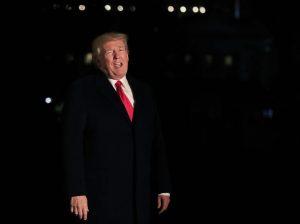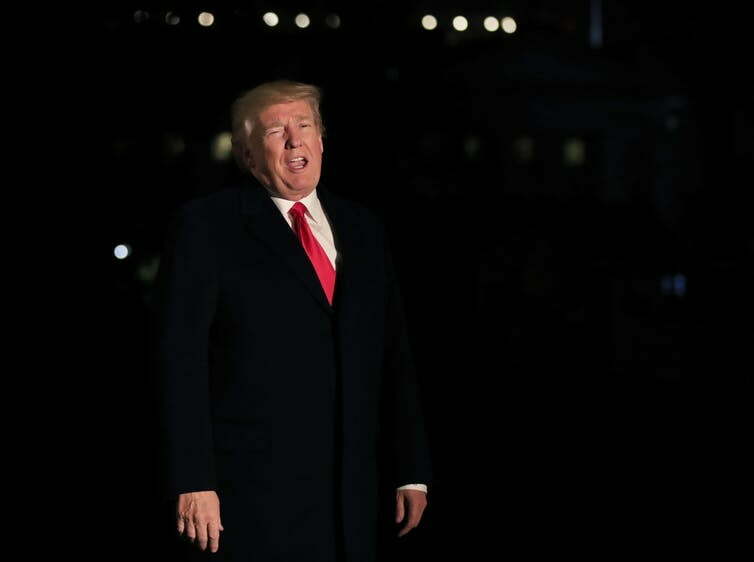2018-01-30 By Danny Lam
Donald J. Trump was the first candidate to become president of the United States without prior experience as a military leader, a politician or ever having held a senior government post.
As he delivers his State of the Union address this week, the president has the lowest approval rating of any modern-day commander-in-chief.
Yet he carries enough appeal to illustrate that what people say to pollsters isn’t always how they cast their ballots. After all, polls overwhelmingly predicted Trump’s electoral defeat in 2016, yet he won handily.
Polls are now indicating a failed presidency.
Is it?
 U.S. President Donald Trump speaks to reporters upon arrival at the White House from the World Economic Forum in Davos, Switzerland. (AP Photo/Manuel Balce Ceneta)
U.S. President Donald Trump speaks to reporters upon arrival at the White House from the World Economic Forum in Davos, Switzerland. (AP Photo/Manuel Balce Ceneta)
Election rhetoric, more often than not, withers in the face of reality once a candidate becomes the sitting president. Not the case with Trump.
Henry Kissinger noted that Trump is different from most because he owes very few favors and debts to others. In that regard, Trump has had a freer hand than most politicians.
The Trump administration has seen more than its share of problems, not surprising given that an outsider group — separate and distinct from the political class of both dominant parties — has taken power.
Candidate Trump went through three sets of top campaign officials, and two top transitional team leaders, before he assumed office. He’s now on his second set of White House staff and cabinet members. And today’s Team Trump is beginning to deliver eyebrow-raising change in many areas, from defense to the economy.
Trump’s message unfiltered
What has stayed constant, however, is Trump’s approach to governing by bringing his message directly to his constituents by means that include Twitter and political rallies.
His speech and mannerisms not only reflect the aforementioned free hand, but also a fundamental break from the carefully crafted, controlled politician-speak that became dominant in the late 20th century in most industrialized democracies.
Trump-speak has barely changed since his campaign began. It’s not classical politician-speak, which prioritizes an avoidance of publicly offending anyone. Making offensive comments, after all, can cost votes that could tip an election or derail a legislative agenda. Internationally, if a president routinely offends the country’s foes and allies alike, delicate relationships are put at risk.
Measured and controlled speech that carefully avoids upsetting anyone and not playing fast and loose with readily disproved facts is what politician-speak is all about.
Politicians usually deal with any significant, legitimate domestic concerns by appeasement: Using “motherhood and apple pie” references in public statements, and delivering speeches that more often than not don’t result in any substantive action unless it’s a bona fide priority of their administration.
As long as not openly spoken of approvingly by those in authority, many alleged universal evils, like systemic racial discrimination, can quietly continue.
No spit-and-polish
Other ongoing concerns, like the investigation into Trump’s alleged ties to Russia, allow opposing politicians to appear righteous and therefore exempt from the civility of politician-speak. Their targets can be openly denigrated, insulted and vilified.
Candidate Trump, and now President Trump, made a clean break from this 20th-century tradition by speaking to Americans and the world in a plain-spoken, homey and at times explicit manner free of the spit-and-polish that all democracies have come to expect of their politicians.
Frank Bruni, the New York Times columnist and no friend of the president, termed him a radically honest politician in some ways. Bruni observes there is more transparency into the president’s beliefs and ideas, and his thought processes —however wrong or misled he might be — than there has been for any previous president in recent memory.
We know that some politicians aren’t much different from Trump privately because there is a long trail of what they really thought and said during unguarded moments.
On tape, Richard Nixon was profane and angry about his perceived enemies, including Canada’s Pierre Trudeau. Lyndon Johnson was much warier in private comments about the Vietnam war than he was in public.
The difference is that past presidents and establishment politicians hid their true beliefs better, and a less critical media helped.
Trump, on the other hand, has faced hostile media worldwide that amplify every “misstep.”
Trump’s “open source” thoughts are unprecedented in any modern politician. This radical transparency allows us to understand the president in a way that no other modern politician can be understood.
Trump supporters hear and see a man whose thoughts and beliefs are similar to theirs, whom they know expresses ideas that they cannot speak out loud unless in safe, like-minded and trusted company — or they risk being branded racist, sexist, homophobic and xenophobic, or, as Hillary Clinton termed them, “deplorables.”
Such accusations are not just rhetorical. In the #MeToo era, they’re now more than sufficient grounds to cause careers and lives to go up in smoke, to cause politicians to be forced from their posts, to be denied equal protection under the law and to be vilified in public in a way that can never be erased in the age of the internet.
The internet-amplified accusations, often dating back decades, are enough to derail many prominent people’s careers, whether they’re guilty or not.
Trump’s tweets, comments are a goldmine
Trump-speak, therefore, is a goldmine for those making accusations. The president’s unfiltered, often anger-fueled tweets and public remarks have lead to charges that, to name just a few examples, he’s an enemy of prosperity due to his protectionism, that he’s racist, sexist, Islamaphobic or just plain boorish.
But to date, none of these accusations have bothered his base — or the American economy. Business confidence in America is at an all-time high since 2008, while unemployment is down.
Trump, by breaking from the “offend no one” style of political discourse, still appeals to those Americans who share beliefs with him that are largely overlooked by the incumbent political class that the president is dismantling.
But it is not “populism,” per se. Most populists, like the Nicolás Maduro regime of Venezuela, do not have an agenda for radical change. Trump, on the other hand, insists he’s all about remaking America.
The question is, remake America in what way?
Trump’s beliefs do not fit neatly into existing and established factions of the Republican or Democratic party. His ideas are a mix from both parties that is more than pragmatism — defined as expedient ad hoc solutions that most politicians end up practicing with a slight tilt to the traditional “left” or “right.”
Trump is about more than muddling through, or incremental change. He is a president of radical change.
His takeover of the Republican Party was a hostile one that paid lip service to most of the party’s ideological dogma.
That’s why it’s been so difficult for any political class to coalesce around Trump. He is not really a Republican or a Democrat, but a cross-dresser with new, radical ideas.
Remaking politics
As we may see once again when the president delivers his State of the Union address, what Trump is about is remaking the American body politic. And it is happening, subtly, behind the scenes; it’s beginning to emerge how radical the changes are that he’s bringing about in defense, taxation and regulation, to name a few. No wonder the political class, tied to the perquisites from the established order, is revolting.
Trump is attempting to remake government in a manner that has not been done since President Franklin D. Roosevelt. And Trump-speak is a key component of that overhaul, because it allows for the open discussion of the many problems America and the world is facing but are usually only spoken about in whispers behind closed doors.
Trump’s greatest achievement is breaking the old political order — its stranglehold on power and its control of political discourse.
This will be the legacy of Trumpism as it reinvents how politics is conducted in the 21st century.
This article has been republished with the author’s permission and first appeared in the following:
https://theconversation.com/how-donald-trump-is-retooling-politics-for-the-21st-century-90836
Please also, see Harald Malmgren’s recent piece as well on the Trump effect:
Changing Political Dynamics in the United States: Trump as a Political Icebreaker


